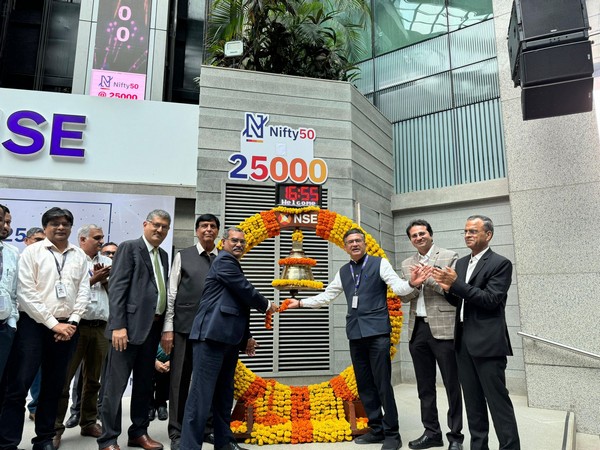
Mumbai: The Nifty 50 index hit the 25,000 mark for the first time during Thursday session, and managed to hold on to the gains.
The index hit the 20,000 mark for the first time on September 11, 2023, and took 221 trading days from that level to hit the 25,000 mark on August 1, 2024.
Nifty has cleared 25,000 at the close of Thursday, which is a very important milestone for Nifty and also for the country, said National Stock Exchange MD and CEO, Ashishkumar Chauhan, talking to reporters.
"It also shows some confidence in the new government, which is also in a way showing continuity because they have been there for 10 years and this is a show of confidence for the next five years too," Chauhan said.
Overall, the Nifty has given returns over the last one year of more than 26 per cent compared to Standard & Poor's which has done 20 per cent and Sensex which has accumulated around 22 per cent gains, Chauhan said.
"And Nifty has achieved 25,000 from 20,000 in that 5,000 points distance in around 11 months compared to the 15,000 to 20,000 numbers that Nifty had covered in 19 months, that's one year and seven months."
"So effectively, the growth in Nifty of every 5,000 points is actually becoming shorter and shorter. And it shows a great amount of confidence by Indian small investors, financial institutions, and also by foreign investors now."
Overall, Chauhan asserted that it's an indication of what people expect India to do in the future.
"In a way, the last impetus came from the budget of the financial year 2024-25 and now people will be waiting for RBI interest rates declaration or the Fed interest rate declaration, so those are the kind of new triggers. And of course India is the fastest growing large economy in the world so our own numbers on a quarter basis."
"So that's where now slowly the market has realized that it's a good budget which is going to improve the growth in the economy, and that's what they are now voting with their money," he added, talking to reporters.
India is now a very vibrant market and the fourth largest market in terms of market capitalization in the world after US, China, and Japan.
"And naturally, you know, financialization, which is happening through UPI and other means, that's also reflecting in people putting more money into equities vis-a-vis other asset classes, and hopefully that continues, which will help in creating a virtuous cycle where people save the money, they put in their money in the companies, and then those companies create more jobs, which create more employment, and then those same people who are getting new jobs end up saving and putting into the companies again and again. So that's what has happened in Europe. That's what has happened in the US during their rapid growth time, and that's now happening in India," added Chauhan.